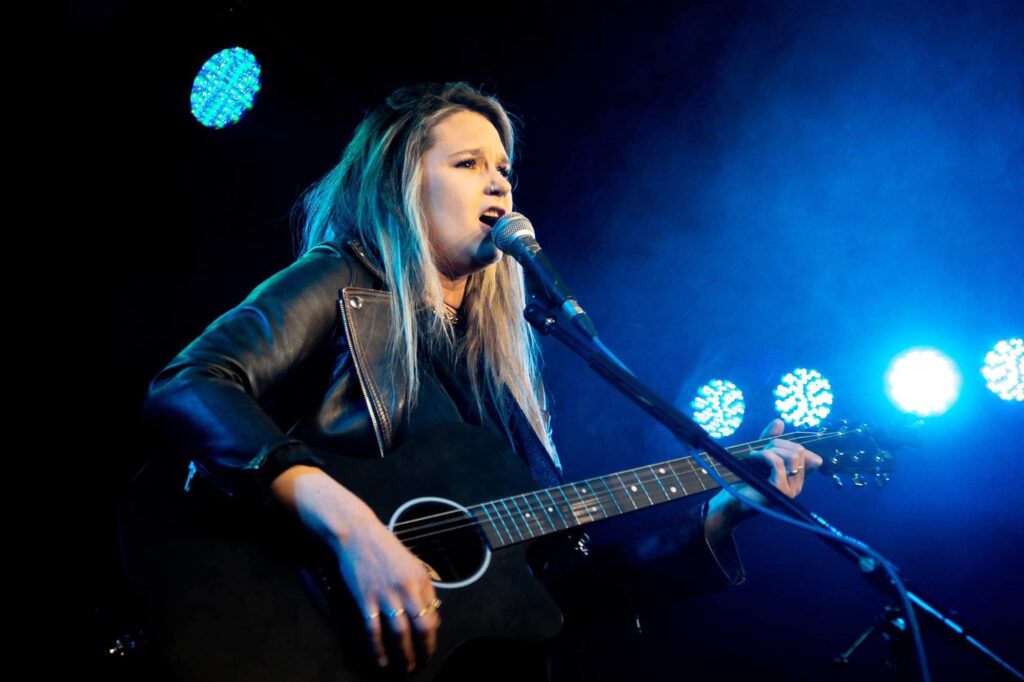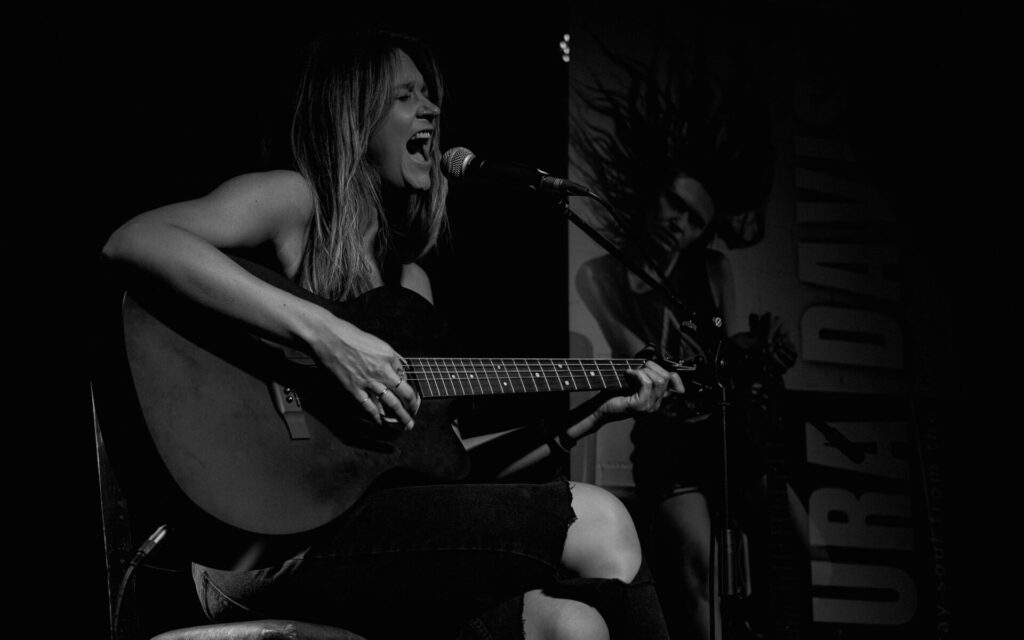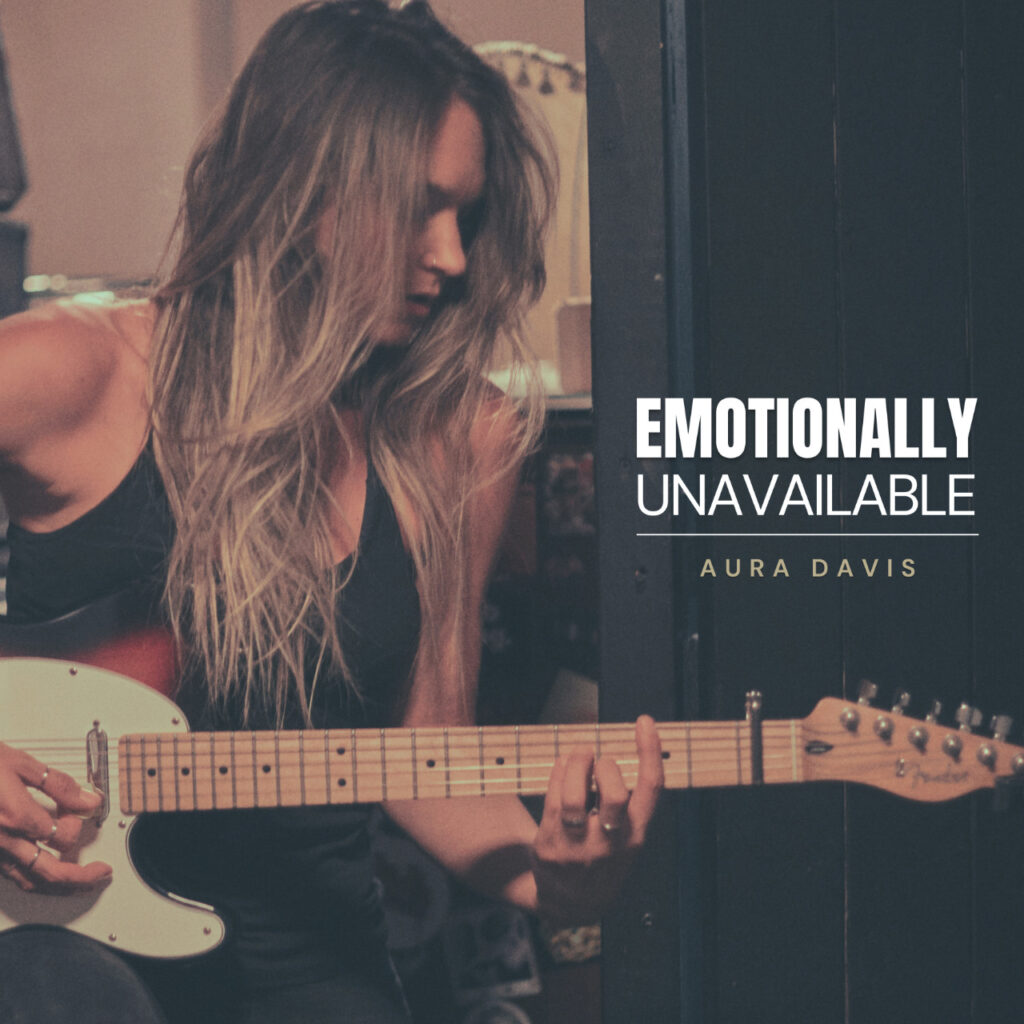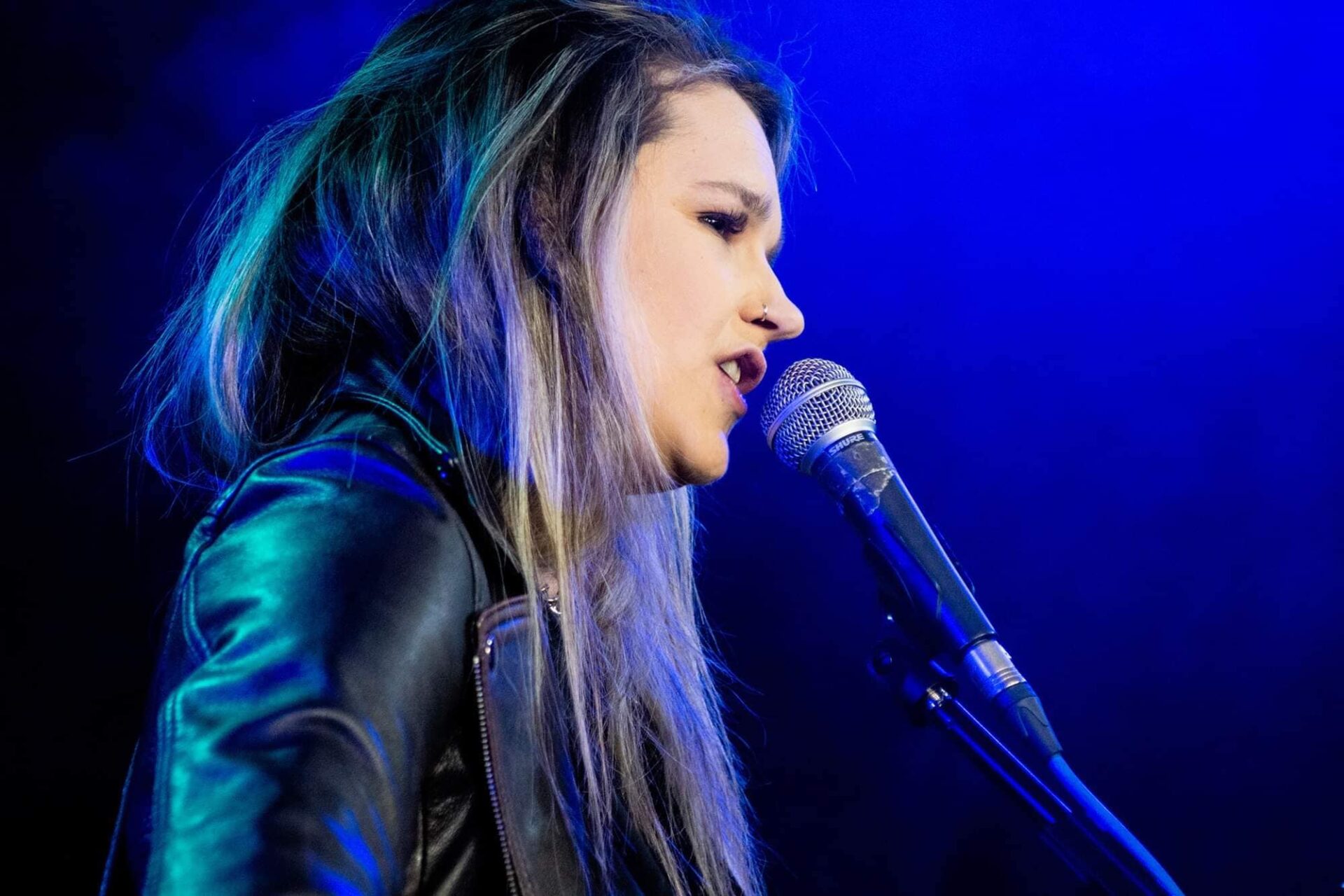Aura’s way of properly ending her first musical chapter before beginning a new one with her official full-length debut record is through the EP Emotionally Unavailable, which comes before the album. It includes 3 acoustic, raw versions of her singles that have received more than 250 000 streams to date as well as 4 previously released songs for the first time ever. Additionally, there are two unreleased bonus tracks that exhibit a completely different side of the singer.
According to a recent article in The New York Weekly, “Aura’s journey propelled her to the forefront of the industry.”

1. Can you tell us a bit about where you come from and how it all got started?
AURA DAVIS: My name is Aura and I am based in Switzerland. But currently travel back an forth between the UK and my hometown a lot because I’m recording my album in London. I guess the desire to become a musician has always been there. I started to write when I was 4 years old – the moment I was able to hold a pen changed everything for me. I have always been a loner and spent a lot of time on my own, which led to me spending hours in my room reading books and pen them myself. I wrote a lot of short stories and poems back then. The same counts for my love for singing. I have always been singing. The actual music side of it, came many years later though. I picked up my guitar and wrote my first song on guitar at about 22 I guess. It was an older piece of lyrics I had written some years before. I loved it a lot and thought – hey, I could turn this into a song now. And that’s what I did. And I haven’t stopped ever since.
2. Did you have any formal training or are you self-taught?
AURA DAVIS: Na, I’m not “trained” or anything. I just sing and play what comes naturally and feels right. I tend to follow my intentions when it comes to music. Now that I’m playing live all the time, I started to spend more time on guitar practice though. I’m definitely not a shredder that plays the most complicated riffs, but that’s also not really my intension. I use my instrument to underline the story I’m telling. However, it’s always good to expand your skillset and learn more. I think that makes you a better writer too in the end. The more you know, the wider your possibilities.
3. Who were your first and strongest musical influences and why the name ‘AURA DAVIS’?
AURA DAVIS: My main influences are people like Melissa Etheridge (she’s like the coolest rock-chick that ever existed), Kelsea Ballerini (I just can’t get over how incredible her vocals are), The Pretty Reckless (a little sexiness never hurt no one) and Steven Wilson. Steven Wilson is the brains behind my favorite band ever, Porcupine Tree. Their music saved my life some years ago when I was drowning in depression really deep. So you see, my influences are a little all over the place and come from very different niches.
My stage name isn’t totally random. I knew I wanted it to be short, simple and recognizable. My real name is beautiful, I’m half Italian and my last name is pretty damn complicated and no one ever knows how to pronounce it 😊 No kidding, even my doctor gets it wrong even after 10 years. Davis is a combination of letters out of my parents first names. Simple as that. And Aura isn’t that far from my real name though. Do the guessing.
4. What do you feel are the key elements in your music that should resonate with listeners, and how would you personally describe your sound?
AURA DAVIS: Well, my key element I think is my voice. At least that’s what I’ve been told over the past three years. I think I have a pretty unique way of singing in terms of letting emotions take over when I sing. In regards how my sound. Well, to be honest, up until now, I think there hasn’t been any genre you could’ve put my music into. All my songs that are released are a little different. Some a little more pop-ish, some a little more rock-ish. That has a lot to do with the fact that I have been trying to find out who Aura Davis really is, music wise. As said in one of the above questions about my influences – there are many different things in music that influence me. Finding your own sound turned out to be a journey. I started to work on my debut album in march 2022 and I can gladly say that, now, we found it. A 100%. And I like to put it like this: “Rock’n’roll meets Nashville.”

5. What’s your view on the role and function of music as political, cultural, spiritual, and/or social vehicles – and do you try and affront any of these themes in your work, or are you purely interested in music as an expression of technical artistry, personal narrative, and entertainment?
AURA DAVIS: That’s a good question. Music definitely has always had a foot in political, cultural or spiritual happenings. There are way too many examples to name them. But in my humble opinion, it’s only good if it comes from a place of real honesty or even experience. Just writing about it because one thinks “I probably should” doesn’t quite do it for me. So for me personally, I haven’t written anything like that. It’s not that I say “I’m not interested in that.”. Maybe one day I will. I simply never had a reason to write about those kinda things.
6. What has been the most difficult thing you’ve had to endure in your life or music career so far?
AURA DAVIS: The most difficult thing in life was moving out of my parents home at 15. It was a rough path and anything but easy. I was so depressed and tired of life that I would’ve done anything to just feel something. Which I did. That made me do a lot of things that – looking at it now – could’ve gone really wrong and turn out bad. Gladly, I somehow pulled through and made it out alive.
When it comes to music, the most difficult part was and probably still is, is to find the right people to work with. This industry is full of big egos, scams and people who would tell you anything just to get you to do what they think you should do. Standing your ground and keeping your integrity in place isn’t always easy. I’ve had tons of weird work relationships in the past three years. Had so many calls with so called industry professionals, I stopped counting them. It’s part of the journey, learning to navigate through a whole new business world. But I’m at a point now where I no longer see the need to talk to everyone who sends me an email about a business opportunity. I do a lot of research when I get those and don’t shy away of just saying no to things that don’t feel good. Don’t get me wrong – I’m always open to talk, because in the end, a big network is the key to getting to know the “right” people. You certainly won’t find them if you just say no right away. So, I still have a lot of meetings and calls, but I halved the number of it.
7. Could you describe your creative processes? How do usually start, and go about shaping ideas into a completed song? Do you usually start with a tune, a beat, or a narrative in your head? And do you collaborate with others in this process?
AURA DAVIS: It happens different every time. There’s no real routine here, which is what I love about it. You never know where an idea comes from. Sometimes, it’s a piece of lyric that I find to be interesting, other times it’s just a title or one single word I’m obsessed with. Or it can very well be me sitting with my guitar just playing for fun when I get a real nice melody in my head with no lyrics at all. I have to say though, since I’m a writer first and I always write – I’ve got this never ending list of words, phrases or thoughts on my phone and especially when I get a melody on guitar I go back to that list and start to fill in the blanks and see what happens. It’s important to me to write everything down, even if I’m not actively trying to write a song. I’m that weirdo that pulls out her phone in the middle of a conversation to write things down. I haven’t done collaborations until I started to work on this album that’s about to come out. But, I like to be prepared when I bring ideas into a room in a writing session with others. It’s important to me that I understand what I’m trying to say. So… I enjoy writing alone in the beginning – because it helps me to really dig deep into my feelings. But once I passed that point, I do enjoy bringing my ideas into a room full of other creative writers to get the most out of it. Because let’s be honest, different perspectives sometimes work magic on your own feelings. And outside input has the power to lift a song in ways you probably wouldn’t be able to achieve alone.
8. Do you feel that your music is giving you back just as much fulfillment as the amount of work you are putting into it or are you expecting something more, or different in the future?
AURA DAVIS: See the thing with expectations is that they have the power to make you miserable. Which is why I keep mine very reasonable most of the time. I’ve got people around me that do the “big expectation-thing” for me. I’d rather focus on the work and on becoming the best version of myself I can possibly be. I needed to learn to actually give myself a second to cherish the highs when they happen. I have a tendency to oversee them. I’ve gotten quite good at it by now. So, when I reach a “milestone,” I take a moment to be proud of that. But then go right back to work. And to fully answer your question – the journey I’m on is giving me back all the effort I’m putting in. When someone texts me or walks up to me after a show saying things like “those lyrics really hit me” – that’s what I’m living for. And I read every single message I get on social media or fan letter I receive. I do see it all. That’s the most rewarding thing ever.
9. On the contrary, what would you consider a successful, proud or significant point in your life or music career so far?
AURA DAVIS: One thing that made me really proud and was a milestone moment for me was when I got the chance to play my first show in the UK as a headliner. I have never played in the UK before that and landing the headliner slot amongst 3 other native artists was mind blowing. After I played that show I flew back home and once I got out of the plane I learned that they invited me back for a second headliner gig just 6 weeks later. To experience that kind of acknowledge was pretty awesome.
10. With social media having a heavy impact on our lives and the music business in general, how do you handle criticism, haters, and/or naysayers in general? Is it something you pay attention to, or simply ignore?
AURA DAVIS: Social media is weird. What I love about it that it allows me to talk to people daily, which I do. I try to answer every single message I get. And I also try to read all the comments which mostly is fun. Mostly. There are some comments or messages however that, aren’t quite nice. But it’s part of the game. To give you an example: A few months ago, I did a little cover of Nirvanas “Come As You Are” – just for fun. An acoustic emo cover version and I ended up posting it on my Instagram. And in-between of all the positive comments there was one person who wrote “The world doesn’t need another untalented white girl covering Nirvana”. And I was like oh boy – what is that guys problem. Not gonna lie, at first, it made me sad. But then again, I think I’ve got a healthy relationship with those kinda things. You can’t make them all like you and there will always be people who think you’re shit and that is actually alright. Or another one that wasn’t too nice was, when I posted a photo out of a shoot I did and there was a girl saying “If you were good at guitar you wouldn’t need to thirst trap”. First, I needed to google what it actually meant (laughs). And then I just thought wow, if a photo upsets a person that much, the problem most likely isn’t the photo.
See, there are always people who don’t like how you sing, look or present yourself. But again, everyone’s entitled to their own opinions and when you put yourself out into the public, you gotta live with it. I handle it just like my milestones. I acknowledge it, and keep working. It doesn’t really affect me any longer.
FACEBOOK | INSTAGRAM | TWITTER | SPOTIFY | WEBSITE | YOUTUBE

